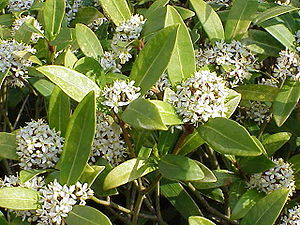Buchu
From Wikiwel
Other Names: Agathosma betulina, Agathosma crenulata, Agathosma serratifolia, Barosma betulina, Barosma crenulata, Barosmae folium, Barosma serratifolia, Bookoo, Bucco, Buccu, Bucku, Bukku, Diosma, Diosma crenulata, Diosma serratifolia, Hartogia betulin, Parapetalifera betulina, Parapetalifera crenulata, Parapetalifera odorata, Parapetalifera serrata, Parapetalifera serratifolia, Round Buchu, Short Buch.
Buchu is a plant. The leaf is used to make medicine.
Special Precautions of Buchu
- The "true" Buchu plant - Barosma crenulata - yields an oil high in pulegone and should be used with care.
- Buchu seems to be safe in food amounts and is possibly safe when used appropriately in medicinal amounts. But it may be UNSAFE in larger amounts and when the oil is consumed. Buchu may irritate the stomach and kidneys and increase menstrual flow. It may also cause liver damage, so liver function in people who use buchu should be monitored by a healthcare provider.
- Pregnancy and breast-feeding: Don’t use buchu if you are pregnant. Buchu might threaten your pregnancy. There have been reports linking buchu to miscarriages.
- If you are breast-feeding, buchu might be safe in food amounts, but don’t take larger amounts. Not enough is known about the safety of buchu during breast-feeding.
- Kidney infections: Even though some people use buchu for kidney infections, health experts advise against this.
- Urinary tract inflammation: Don’t use buchu if you have pain and swelling in the urinary tract.
- Surgery: Buchu might slow blood clotting. There is some concern that it might increase the risk of bleeding during and after surgery. Stop using buchu at least 2 weeks before a scheduled surgery.
- Lithium interacts with Buchu.
- Medications that slow blood clotting (Anticoagulant / Antiplatelet drugs) interacts with Buchu.
Benefits and uses of Buchu are
The therapeutic properties of buchu oil are antiseptic, carminative, diuretic, insecticide and tonic.
- It is thought that the active chemicals in buchu may kill germs and also promote urine flow.
- Urinary tract infections : It was used in the treatment of urinary problems in Africa before Europeans arrived there.
- Kidney infections : The use of buchu can be documented as a treatment for kidney and bladder problems for more than three centuries, and evidence suggests it may have been used as an herbal medicine for thousands of years. Dutch Afrikaners adopted it for the treatment of kidney stones, arthritis, cholera and muscle aches as well as urinary tract infections (UTI).
- Sexually transmitted diseases.
- There were claims that it had mild pain relieving properties as well, but these have not been verified in laboratory tests.
- The Khoikhoi or Khoi, native people of southwestern Africa, developed an alcoholic beverage known as buchu brandy, which is still manufactured and distributed. This brandy was used medicinally by physicians for generations, but has now been discontinued. It is still widely used in home remedies.
- Buchu is a common ingredient in many well-known premenstrual prescription medications. Among many local African cultures, an infusion of the leaves has been used as an herbal treatment for premenstrual syndrome (PMS).
- In the United States, the plant itself is not recognized as a medicinal herb, but the oils extracted from it are used in commercial medications.
- Buchu was first introduced as a patent medicine in New York 135 years ago, and while it no longer sold in the US, it is widely available in Europe.
- This plant reportedly acts as a mild diuretic, and clinical tests have demonstrated that these properties are quite gentle, making it effective for minor treatments, but requiring heavier dosages for more severe applications.
- Buchu is also being investigated for the treatment of high blood pressure and congenital heart failure. The research today proves to be promising, but no definite scientific statistics are as yet available.
